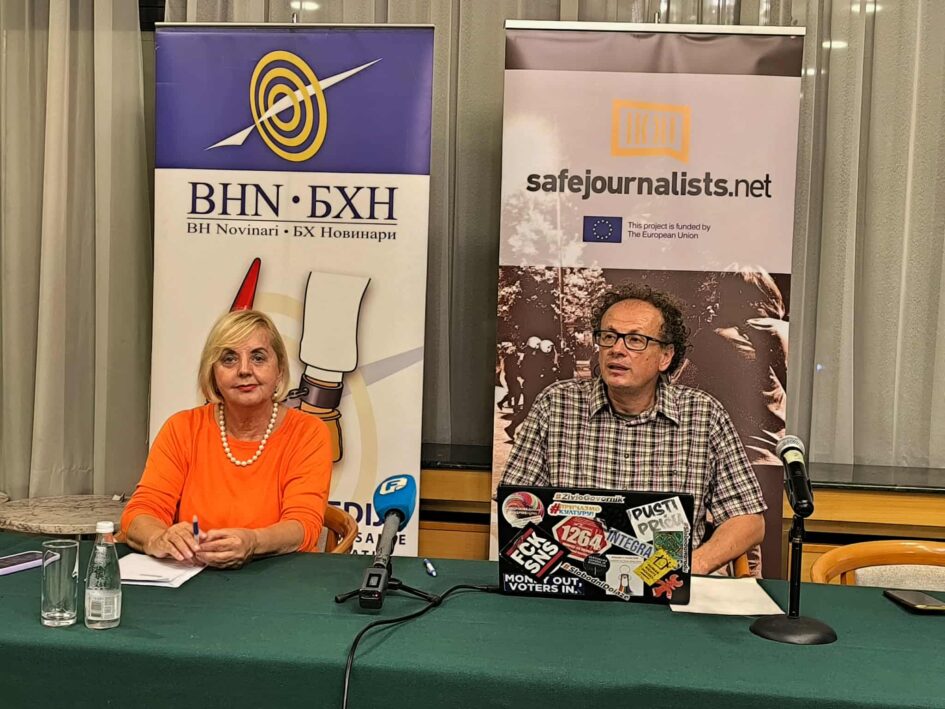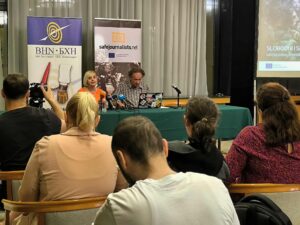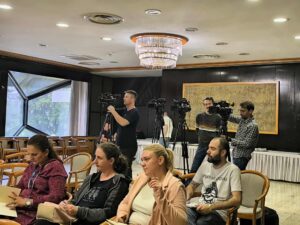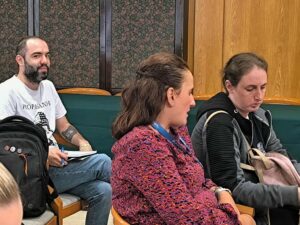
Sarajevo, September 3, 2025 – More than 67 percent of media workers in Bosnia and Herzegovina consider journalism to be a more stressful job than others. At the same time, 40.5 percent of media workers have experienced mobbing at work, and the victims are more often women than men. All this, as well as threats, pressure, low salaries and an uncertain future, have led to one in ten journalists being diagnosed with some form of mental disorder, the most common of which are anxiety, depression and panic attacks.
 These results were presented today in Sarajevo at a press conference organized by BH Journalists and with the participation of Dr. Srđan Puhal. The research on the topic of mental health of journalists in BiH was conducted by the Citizens’ Association Pro Educa on a sample of 316 respondents and via an online survey. The research was conducted with the financial support of the European Union and is part of the project “Free and Safe: Protection of Rights, Mental Health and Safety of Journalists in BiH”, which is implemented by the Association Pro Educa within the framework of the Safejournalists Network Small Grants Scheme.
These results were presented today in Sarajevo at a press conference organized by BH Journalists and with the participation of Dr. Srđan Puhal. The research on the topic of mental health of journalists in BiH was conducted by the Citizens’ Association Pro Educa on a sample of 316 respondents and via an online survey. The research was conducted with the financial support of the European Union and is part of the project “Free and Safe: Protection of Rights, Mental Health and Safety of Journalists in BiH”, which is implemented by the Association Pro Educa within the framework of the Safejournalists Network Small Grants Scheme.
In addition to the fact that 2/3 of journalists believe that journalism is an extremely stressful profession, the survey showed that 40.5% of respondents feel stress often, and 14.9% daily. The main sources of stress are short deadlines, underpayment and political/external pressures. More than half (57.9%) have repeatedly experienced burnout syndrome at the workplace.

“The problems that journalists in BiH most often face, which lead to stress, are: financial uncertainty, mobbing, short deadlines and facing physical threats, even death threats,” said Borka Rudić, Secretary General of the BH Journalists Association, noting that more and more media outlets are being closed, almost overnight, without any explanation, and it seems that journalists in BiH are left to their own devices more than ever before.
Exposure to traumatic topics and reporting on them also cause daily stress for media workers, as does internal violence and mobbing against journalists in newsrooms. Female journalists are more exposed to mobbing in the workplace than male journalists, and the most common perpetrators of mobbing are editors and directors, management, and fellow journalists. “There are different ways to deal with stress, and the ones mentioned by journalists are quite constructive. They are dealing with problems, planning time, and humor,” said psychologist Srđan Puhalo, adding that women cope better with stress because they are more open when expressing their feelings, while men are more closed by nature.
 Exposure to traumatic topics, i.e. reporting on accidents, crime, war crimes, diseases and violence, also causes stress in journalists. These are topics that journalists think about even outside of working hours, and they cannot “put their work in a drawer” and go home without thinking about what they are doing. Puhalo also warned that journalists are often exposed to violence, most often online insults and threats and insults over the phone, followed by stalking. Men more often than women in the media are exposed to physical violence and threats.
Exposure to traumatic topics, i.e. reporting on accidents, crime, war crimes, diseases and violence, also causes stress in journalists. These are topics that journalists think about even outside of working hours, and they cannot “put their work in a drawer” and go home without thinking about what they are doing. Puhalo also warned that journalists are often exposed to violence, most often online insults and threats and insults over the phone, followed by stalking. Men more often than women in the media are exposed to physical violence and threats.
“More than one-third (36.6%) of media workers experienced a high degree of exhaustion,” said Puhalo, and added that the respondents’ life satisfaction is above average, but it is significantly reduced by the feeling of material insecurity, uncertain future, burnout and mobbing.
 You can view the summary of the research and the main recommendations at this .
You can view the summary of the research and the main recommendations at this .
This research has been produced with the financial support of the European Union. The contents of this document are the sole responsibility of Pro Educa and can under no circumstances be taken to reflect the views of the European Union.
The project “Free and Safe: Protection of the Rights, Mental Health and Safety of Journalists in BiH” is supported by the Safejournalists.net support programme.
Author: Anđela Koroman
Photos: BH Journalists, private archive



